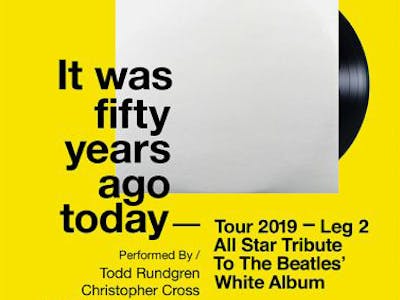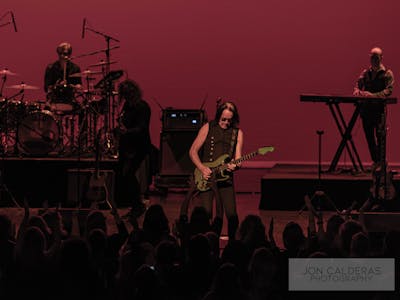It’s a great time to be a Todd Rundgren fan. Todd has been busy with multiple projects and tours over the last couple years. This fall, he’s back on the road with “It Was Fifty Years Ago Today- A Tribute to The Beatles’ White Album”. He’s accompanied by Mickey Dolenz (The Monkees), Christopher Cross, Jason Scheff (Chicago), and Joey Molland (Badfinger). The set will feature both songs from the individual artists and The Beatles’ The White Album (or more accurately– The Beatles’ The Beatles).
Todd Rundgren’s life story is too long to recap here. If you want a deeper dive, check out his book The Individualist: Digressions, Dreams & Dissertations, released at the end of 2018. A few touchpoints are useful in navigating this interview. Rundgren formed Nazz in 1967 and that early music was largely inspired by The Who and The Beatles. He went on to a successful solo career in the ‘70s and became a go-to producer for acts such as Patti Smith, Hall & Oates, Grand Funk Railroad, New York Dolls and Meatloaf. His work on Bat Out of Hell helped make itone of the best-selling albums of all time (43 million copies and counting). He formed Utopia as a side project and continued to experiment in multiple styles. Rundgren has always pushed the edges of technology-he was an early adopter of music video, the internet, interactive music and digital technology. If you don’t own one of his albums, you’ve felt his influence on the art form.
The Beatles (aka The White Album) came out on November 22, 1968, a month after Nazz released their first album. Split among four sides of vinyl and 93 minutes, it’s a fascinating aural picture of a group falling apart. Coming just eighteen months after the landmark Sgt. Pepper’s Lonely Hearts Club Band, it was a shock; fan and critical receptions were mixed but it has become legendary and is regarded as a classic.
Cincymusic chatted with Rundgren about his personal take on the album and how he’s approaching the tour. As I transcribed our interview, it struck me that there is a big difference in how the words appear in print vs. how they sounded or felt during our discussion. Todd has a wry sense of humor and doesn’t mince words; sometimes tone is hard to read on the page but if you keep that archness in the back of your mind as you read it, you’ll get close.
CM: You’ve been incredibly busy the last couple of years. Between the Utopia reunion, the [Utopia] live album, the DVD and CD, The Individualist book, the book tour, and now this tour. You’ve been insanely busy. What’s driving all the activity, especially on the road? That’s got to be exhausting.
TR: Well, you know the music business has changed a little [laughs]. You know, I used to do a pretty good business as a producer which made it possible for me to be a lot more selective about when I went out on the road and what I did when I got there. But as time has passed, touring becomes the principal form of income for me. It’s not as if there isn’t production to be done any more, but along with the record business kind of changing and mutating, that whole traditional relationship that I used to have with an artist has kind of changed. If you look at a modern record, each song has maybe five songwriters and three producers [laughs].
CM: Right, yeah, it’s crazy. And I have to imagine – now the tools, for better or worse, are in the artist’s hands-so, a lot of people are taking it on themselves when maybe they shouldn’t.
TR: There’s that as well. Which I think is great that more people have the tools to be able to make the records themselves and that accessibility gives them the opportunity to learn the stuff that I know. [laughs]. It doesn’t give them my sensibility, but it definitely lowers the apparent value of what I contribute, so…
CM: Well, I think one of the things that you’ve always uniquely added is your perspective not only as a songwriter, but as guy that can play piano and guitar, a great lyricist, and also a producer and engineer. And you understand all the technical ins and outs, so I think having that kind of critical perspective on your own work would be super valuable for somebody even if you have the tools to do it. Just having that kind of guidance and having that more clinical look at your own work might be valuable. But that’s just my take as someone who’s not in the business.
TR: Well, there aren’t as many artists now a days that are concerned with that.
CM: Wow.
TR: You know, [it’s like] you call yourself a musician, but music is just part of your overall personality marketing. It’s like, can you hum a single Cardi B song [chuckles]? No. The music is just like the rest of the merchandise. It’s like the shoes or it’s like the cologne [laughing] or whatever else you manage to slap your name on [laughing].
CM: So, what I hear you saying is that they’ll be a Something/Anything? cologne for next holiday season.
TR: Yeah, something like that [laughing]. I myself am the product. Everything else is just advertising for me [amused].
CM: Well, fair enough – I think it’s personal branding and you gotta do what you gotta do as an artist to keep your art alive.
TR; Yeah, but that’s what I mean, it isn’t art, it’s marketing. It’s still referred to euphemistically as “art” in the same way that we refer to, you know, all musicians euphemistically as “artists”. Technically what they’re doing is not necessarily art- it’s entertainment.
CM: It’s a wide spectrum for sure of what falls in that bucket. So, the tour is going to be featuring songs from The White Album- I’m going to call it that instead The Beatles, otherwise I get confused every time I say, “The Beatles”.
TR: [Laughs] It’s a confusing record all around.
CM: That’s what I’d love to know your perception of. I was two when the album came out. It literally came out on my second birthday. So, I didn’t really experience it when it came out. I’ve only been able to appreciate it one, as a music fan and two, in the context of everything that came out after whether it was the rest of The Beatles, Wings, solo stuff, or punk rock, everything else in that mix and context. But you were unique in that Nazz [his first band] was starting out about the same time, so your career was starting. And I assume you were a fan as well, so you had one lens on it. But as we said, you’ve had this fifty plus years of creating your own music, music with Utopia, recording other folks, engineering and also playing with Ringo and interpreting some of The Beatles’ songs on your own album. So, what was your take on it back in the day as a young musician and a fan and now in the latter day as you’re interpreting them after living with them for 51 years. Do you appreciate them more as a producer or in context of the cultural relevance they’ve taken on? Can you take yourself back and describe your reaction to getting that album and playing it the first time?
TR: Um, [pause] I was hugely disappointed in the record.
CM: Oh, wow.
TR: And I don’t think my reaction was unusual. I’ve said this before – as a Beatles record, it was a terrible record. Because it was not The Beatles. It was the four guys in The Beatles, well, three guys and Ringo [laughing], already thinking about their solo careers and they’re already writing and making material that doesn’t involve anyone else in the band. And often the material just it’s just, you know, it’s self-indulgent. Um [pause], dolorous, pointless sometimes [laughing]…
CM: Wow, these quotes are going to read really great Todd [laughing].
TR: You’re not the first one that I’ve told this to [laughing]. The point is you had the luxury of not having lived through the entire career of The Beatles and having that influence from the first time you heard them and everything they did up until that point. And realizing that the thing that you had believed in in a way which was the false democracy that the four mop top lads represented was suddenly crumbling before your eyes and ears, you know? Because you know John Lennon fricking hated “Honey Pie” [laughs]. You know he hated it. That’s not the only thing he hated.
CM: Right. And when he heard “While My Guitar Gently Weeps” he’s probably also burning with, I expect on some level, some jealousy because it’s such a transcendental song, it’s like, “Wow, where did that come from?”
TR: Well, exactly. The fact is it was the four of them already with one foot out the door and starting to make their own solo records. The redeeming aspect of that record was George Harrison sort of blossoming as a songwriter. Finally having the opportunity because of the amount of real estate available [laughing] to have more than one song on a record. So, that was kind of a positive aspect of it. But, you know, there were negative aspects of it. There was John - he kept going from one form of psychoanalysis to the next, bemoaning his upbringing in front of all of us [laughing]. And stuff like that. And settling old scores or whatever else he’s doing there. While Paul McCartney is just simply trying to prove that he can do shit for no reason at all. Write a song like “Honey Pie” simply because…my guess is he found out [New Vaudeville Band’s] “Winchester Cathedral” made number one and he thought, “Oh, I can do that.”
CM: [Laughing]. Interesting.
TR: I even heard a story that “Helter Skelter” was essentially - that some other band said, “Oh, we just recorded the loudest song ever”. And so, Paul McCartney says, “Oh yeah?” [chuckling]. So, he writes this song just to prove he can write the loudest song ever. You know? [laughing].
CM: So, you’re listening as a fan that grew up with on the journey and you had this sense of disappointment at the time. If you look back – we have some distance from those times, obviously. As a producer who’s crafted other people’s music – I think of XTC’s Skylarking where you came in with a vision of what that song cycle was and how it hung together – I don’t really get that feel with The White Album for a lot of reasons. One is what you said, that it feels like it’s pulling in all these individual directions and it’s not really cohesive. But if you look at it now either as fan, producer or performer would you say, “Wow there’s a way to trim that into one album that feels like an amazing cohesive whole?” Or not? Has your perception mellowed over the years now that we have that distance?
TR; Well, I think that’s possible. As I said, there are bright spots throughout, despite, you know, the self-indulgences. You know, even George Martin, who was sidelined for the record, said, “That would have made one great record [laughing]”. Unfortunately, it ended up as like half a great record just because they ruined it, it’s a bad record [laughing]. The problem is also that they didn’t even have enough creativity out of that process to fill the whole record up, so they just started throwing junk on it [laughing]. “Sweet Honey Pie” and “Why Don’t We Do It in the Road?” [Laughing] What is the point of that?
CM: I’ve been listening to it [The White Album] a lot the last week to refresh myself. I find myself drawn to songs that didn’t get airplay. I’m going to blank on it because I don’t have it in front of me, but there’s a song towards the end of the album. The one that’s right before “Revolution 9” [“Cry Baby Cry”]. It’s a beautiful song which I don’t think I’ve ever heard on the radio. But I hear “Birthday” every other day. It just makes me wonder why some of those gems never shook loose out of there. So, as you’re picking the songs to perform then, if it’s such a mixed bag, how are you curating your live take on it?
TR: Well, I took “While My Guitar Gently Weeps” off the table right away. Because I have played that song in so many different contexts, I almost own it myself [chuckles], so I knew I was gonna do that. As far as the other ones, I tend to be able to sing the harder stuff in a way that none of the other guys can cover. Christopher Cross always sounds like Christopher Cross.
CM: Sure.
TR: Which is good for the gentler McCartney stuff. You know, it works for “Martha My Dear” and that sort of thing. Um, and they’ve got their particular ranges. Jason can sing really high, but he doesn’t sing harsh, he sounds too nice [amused]. I wind up, you know, wherever it’s necessary to sound harsh like on “Helter Skelter” or something like that. I wind up with those songs. “[Everybody’s Got Something to Hide Except] Me and My Monkey”. Again, another kind of screamer.
CM: That definitely sounds like one I can see you singing.
TR: Yeah. But I also got a couple ones where –I like to be a little a bit theatrical where the material warrants it. And so, I’ve got a couple of songs where I can dress up and mess around with the audience. Like, I do “Sexy Sadie” as the Maharishi [laughing]. And I do “Bungalow Bill” as Bungalow Bill himself.
CM: Nice. So, related to context and attitudes at the time – Mickey Dolenz is touring with you, is that correct, still?
TR: That’s correct.
CM: Again, growing up past that era, I always loved The Monkees, I never had that baggage of “hey, you guys are the Pre-Fab Four, you guys are a knock off of The Beatles”. I just thought, hey, these are really great songs. And obviously they didn’t write a lot of their early stuff.
TR: Well, they hired the best songwriters.
CM: Exactly.
TR: And they also hired the best players in the business to play on their records. That’s something that a lot of people, since they didn’t understand [the] process, thought they were a real band. They were never actually a real band, they discovered that when they went on the road and tried to play [laughing].
CM: Speaking of being on the road, you’ve been touring with Ringo for – thirty years now? Has it been that long? Close?
TR: On and off. First tour I did with him was in ’93, I think. Then I did another one in ’95, and then did not tour again with him until 2010 when he put together essentially the band that was his official All-Star band for five and a half years. And it was like a year and a half, two years ago, that I left the band and Richard Page left the band and that was a significant change in the lineup. But, um, yeah, it was great. It was a lot of fun. It essentially swelled my touring schedule to the point that I was out sometimes eight or ten months a year during that period. So, I’m sort of glad I don’t have that additional commitment any more. So, I can pretty much focus on what I want to do, and I’ve got the time to do things like this [tour].
CM: Yeah, you’re busy enough. I’ve got one more thing, it’s more a comment than a question. As a guy from Ohio and long-time fan of yours, I would be remiss if I didn’t congratulate you, although I know it’s not the most important thing in your life, on the nomination for the Rock and Roll Hall of Fame. So, congratulations.
TR: No comment? [laughs]
CM: I know I’ve read it’s not that big a deal for you, but I think it’s a fantastic acknowledgement of your talent and I think personally, you should be in there two, three, or four times – producer, Utopia, maybe even Nazz and definitely solo. So, hopefully, we’ll see what happens. Congratulations.
TR: [Amused and animated] You know, my opinion is – any band you know you’re never going to see again, just put ‘em in. You know? Put ‘em in and just stop with the charade. The charade of the fan vote. Did you see how far down in the fan vote T. Rex is?
CM: Yes.
TR: T. Rex should just be in. They should just be in.
CM: Yeah, and MC 5.
TR: Motorhead should just be fucking in. Thin Lizzy, put ‘em in.
CM: Exactly.
TR: Put ‘em in.
CM: Could not agree more.
TR: Put ‘em in there, those bands are never going to play again!
CM: Great talking to you and cannot wait to see you play again. This will be the third – no fourth time in about a year and a half that I’m going to see you on stage. It’s crazy.
TR: [Laughing] Yeah, I gotta stop this.
CM: Nah, I’m holding out for 2022 Something/Anything? [50th anniversary] and just perform it top to bottom. That would be awesome.
TR: Okay [unconvinced, laughing].
The “It Was Fifty Years Ago Today” tour hits The Aronoff Theater on Sunday, December 1, 2019.




